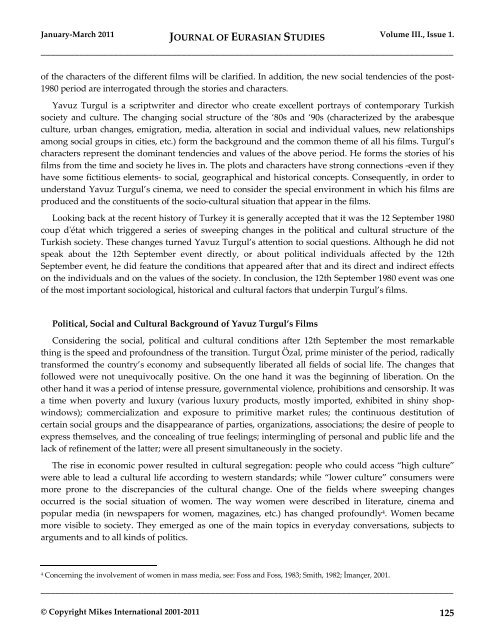JOURNAL OF EURASIAN STUDIES
JOURNAL OF EURASIAN STUDIES
JOURNAL OF EURASIAN STUDIES
You also want an ePaper? Increase the reach of your titles
YUMPU automatically turns print PDFs into web optimized ePapers that Google loves.
January-March 2011 <strong>JOURNAL</strong> <strong>OF</strong> <strong>EURASIAN</strong> <strong>STUDIES</strong> Volume III., Issue 1.<br />
_____________________________________________________________________________________<br />
of the characters of the different films will be clarified. In addition, the new social tendencies of the post-<br />
1980 period are interrogated through the stories and characters.<br />
Yavuz Turgul is a scriptwriter and director who create excellent portrays of contemporary Turkish<br />
society and culture. The changing social structure of the ‘80s and ‘90s (characterized by the arabesque<br />
culture, urban changes, emigration, media, alteration in social and individual values, new relationships<br />
among social groups in cities, etc.) form the background and the common theme of all his films. Turgul’s<br />
characters represent the dominant tendencies and values of the above period. He forms the stories of his<br />
films from the time and society he lives in. The plots and characters have strong connections -even if they<br />
have some fictitious elements- to social, geographical and historical concepts. Consequently, in order to<br />
understand Yavuz Turgul’s cinema, we need to consider the special environment in which his films are<br />
produced and the constituents of the socio-cultural situation that appear in the films.<br />
Looking back at the recent history of Turkey it is generally accepted that it was the 12 September 1980<br />
coup d'état which triggered a series of sweeping changes in the political and cultural structure of the<br />
Turkish society. These changes turned Yavuz Turgul’s attention to social questions. Although he did not<br />
speak about the 12th September event directly, or about political individuals affected by the 12th<br />
September event, he did feature the conditions that appeared after that and its direct and indirect effects<br />
on the individuals and on the values of the society. In conclusion, the 12th September 1980 event was one<br />
of the most important sociological, historical and cultural factors that underpin Turgul’s films.<br />
Political, Social and Cultural Background of Yavuz Turgul’s Films<br />
Considering the social, political and cultural conditions after 12th September the most remarkable<br />
thing is the speed and profoundness of the transition. Turgut Özal, prime minister of the period, radically<br />
transformed the country’s economy and subsequently liberated all fields of social life. The changes that<br />
followed were not unequivocally positive. On the one hand it was the beginning of liberation. On the<br />
other hand it was a period of intense pressure, governmental violence, prohibitions and censorship. It was<br />
a time when poverty and luxury (various luxury products, mostly imported, exhibited in shiny shopwindows);<br />
commercialization and exposure to primitive market rules; the continuous destitution of<br />
certain social groups and the disappearance of parties, organizations, associations; the desire of people to<br />
express themselves, and the concealing of true feelings; intermingling of personal and public life and the<br />
lack of refinement of the latter; were all present simultaneously in the society.<br />
The rise in economic power resulted in cultural segregation: people who could access “high culture”<br />
were able to lead a cultural life according to western standards; while “lower culture” consumers were<br />
more prone to the discrepancies of the cultural change. One of the fields where sweeping changes<br />
occurred is the social situation of women. The way women were described in literature, cinema and<br />
popular media (in newspapers for women, magazines, etc.) has changed profoundly 4 . Women became<br />
more visible to society. They emerged as one of the main topics in everyday conversations, subjects to<br />
arguments and to all kinds of politics.<br />
4 Concerning the involvement of women in mass media, see: Foss and Foss, 1983; Smith, 1982; İmançer, 2001.<br />
_____________________________________________________________________________________<br />
© Copyright Mikes International 2001-2011 125

















